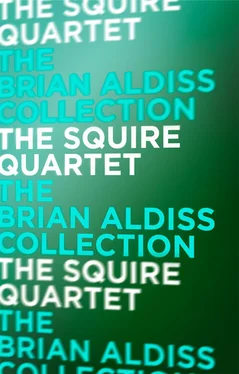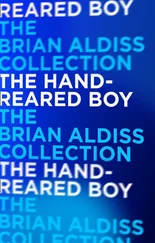The waitress had brought the bill on a saucer. Squire brushed away his uncle’s hand and produced some money.
Willie shook his head. ‘I’ve got a set in my flat. Never switch it on, except for the news. Give me a good book any day. Harrison Ainsworth, he’s a good author. I’m just rereading The Tower of London. It’s full of incident and good description.’
‘Very pleasant, I’m sure, Uncle.’ He signalled impatiently to the waitress. ‘You do not refute, you illustrate what I was saying. Carlyle said people always loved the past and the things of the past because it was safe, whereas the future was dangerous, since it had still to be negotiated.’
‘Carlyle was a sensible chap.’
They parted outside the shop, shaking hands. Squire walked briskly in the direction of the Castle. He was angry with himself, he hardly knew why; he had been harsher than he intended with his revered relation.
Nicholas Dobson came hurrying up and fell into step with him. ‘You are upset, and I don’t blame you. I have to say to you that some of us at least support you. You add lustre to the family, Tom, and God knows it could do with it. We’re a miserable lot, the Dobsons even worse than the Squires. We’re just lived lives of dull Norfolk monotony for centuries. As for Uncle Willie’s moans about TV, he’s just a disappointed old man. He doesn’t—’
Squire had slowed his pace. Now he halted. ‘No, Willie’s a fine man. If he’s disappointed, it’s because most people end up disappointed if they had any guts in them originally. They start out in life with high hopes and high ambitions which maybe circumstances prevent them from fulfilling, or they can’t overcome their own limitations. Uncle Willie never quite achieved the career he wished for himself. That isn’t to say that he hasn’t been an honourable man, and served others well thereby. I admire Uncle Willie and won’t hear a word against him. I was too quick with him.’
Dobson put his hands in his pockets. ‘You make me ashamed of myself,’ he said, grinning and looking far from ashamed. ‘But I have to listen to Uncle Willie holding forth a lot more than you do.’
‘It was good of you to come after me.’ He clapped the young man’s arm. ‘If you’ve got time to spare, visit the Castle exhibition with me.’
They crossed Bedford Street and climbed the many steps up to Norwich Castle. Squire got out of breath more easily than once he did. After a word with the keeper, who was an old friend of Squire’s, the two men went into the exhibition. It was crowded with tourists. This was not Squire’s favourite way of viewing any exhibition, but he had been abroad when it visited London.
They regarded objects which had come from the Siberian Collection of Peter the Great. Many articles had been preserved by cold, as articles in Egypt were preserved by the dry atmosphere. There were decorations of wood and leather which had once adorned the horses of nomads. All that remained of the dreaded Scythians rested here behind glass: a woollen pigtail case, part of a boot, a child’s fur coat dating from five centuries before Christ. Chance survivors of their culture, these artifacts were beyond price; isolated from it, they were inscrutable. Whilst the permutations of chance which brought them to this foreign place were incalculable.
Since Nicholas Dobson still seemed eager for company, Squire took him to his favourite pub, The Pyed Bull on the Market Square, for lunch after the exhibition. The pub was crowded. They bumped into two of Dobson’s friends, both of whom were cheerful, out of work, and engaged in touring the country picketing nuclear power plants. They regarded nuclear power as too dangerous to use. When Squire offered them a few statistics on the excellent safety record of the industry, they listened politely, smiling a bit, and then went on enthusiastically about the success they had had at Dungeness.
‘There are many reasons why the country needs to develop nuclear power,’ Squire said. ‘I’m sure you know the arguments, and I won’t bore you with them, but it is at present the best practical alternative to coal and oil.’
‘We’ll just have to go without oil when it runs out,’ one of the young men said. He wore a T-shirt with the words ‘Sid Vicious’ across the chest, but was otherwise well-mannered. ‘Get rid of all the cars spoiling towns.’
‘And the lorries, trains, planes, and ships delivering the goods we need,’ Squire said.
‘There’ll be something else,’ said the other young man. ‘Something always turns up, doesn’t it? We’ll develop Uri Geller powers, telepathy, telekinesis … The powers of the human mind are unlimited.’
Almost despite himself, Squire said, ‘Unfortunately, history gives no indication that that is so. The mind has its limitations – it’s almost impossible to pass on the fruits of experience, for instance. Civilizations make mistakes and fossilize and go under. If we continue to impede latest developments by picketing nuclear plants, or pretend that things turn up of their own accord instead of resulting from hard work and applied intelligence, then we shall go down the drain too.’
‘We’re down the drain already, aren’t we?’ The two young men laughed and soon took their leave.
‘Sorry about that, Tom,’ Dobson said. ‘I knew they’d annoy you. They were doing it half as a lark.’
‘I wasn’t annoyed. They told me what they felt. I told them what I felt. I suppose they regard me as an old-fashioned old man with silly ideas. All the same, you observe that the pendulum has swung dramatically – ten years ago, the man in my position would have been conservative and against nuclear plants. The youngsters would have been calling for innovation. But there, neither you nor your friends could know what the pendulum was doing ten years ago. You were still at school.’
‘We were learning about the hazards of nuclear power.’ He drained his glass.
‘Those hazards have been greatly exaggerated – mainly by the Left for its own interests.’
Dobson smiled. ‘I don’t want to get onto politics, not my favourite subject. Thanks. Let me buy you another beer.’
‘No, thanks. I must get home. Nick, it’s sad that your generation should be against such things as nuclear power. My generation believed in the future.’
‘It’s not so much us that’s against it as ecology itself. We want to save the world, not ruin it. You can’t go on for ever piling technology on technology with no thought for the consequences. Surely you can see that.’
‘Nor can you continue to strip a country of military or economic weapons without suffering the inevitable consequences.’
‘People just aren’t patriotic any more in the old way. We’ve learnt better. You are fond of talking about new developments, why can’t you see that one development is the junking of old emotions like patriotism which did so much damage? The world is really becoming one – something you talk about but can’t understand. I can feel as much sympathy for an oppressed Greek or Chilean as I can for my next-door neighbour.’
‘But, Nick, you probably know damn all about the actual problems of people in Greece or Chile. You’ve just read a paragraph or two in some newspaper or seen something on TV—’
Dobson looked angry. ‘I have every respect for you, Tom, but I’m not going to sit here listening to you knock down everything I say. I have a dream of a better, fairer world. Well, let me have it. You told Willie that you believe in dreams, well, let me believe in mine.’
‘If you’re referring to Teresa’s dream, that happened to be a nightmare, and my point was that it was difficult to interpret. So is yours. I believe yours is a dream of evading real responsibilities. It would be nice in a perfect world, to coast along thinking things are somehow improving of their own accord just because you and your pals hope things will work out that way, but in fact the world is filled with powerful enemies who have a rough way with dreams, are quite prepared to step in and impose their own nightmares.’
Читать дальше












